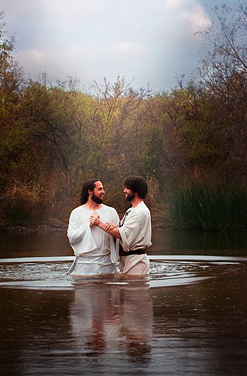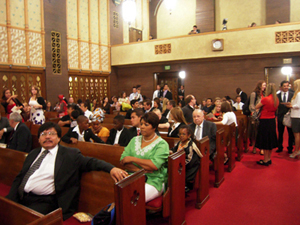Advice for New Members: Dear FL
by -
Jesus Christ was Himself baptized in the Jordan river to provide an example for each of us. (Reflections of Christ)
Here’s some advice I have for you as a new convert. It’s free, so it’s worth exactly what you’re paying for it! 🙂 I see some members of the church, both old and new, making these mistakes. I figure if you can recognize them, you’ll be better able to avoid them!
Be a fully consecrated member of the church
Being a member of the church is like a lot of things in life. The benefit is proportional to the amount you invest in it. If you don’t continue to cultivate your testimony up to and long after baptism, it won’t do much for you.
If you go to church but still take a passive approach to the religion, it will benefit you some. It’s a great way to make friends, for example, and the inspirational messages make people feel good.
On the other hand, if you really dedicate yourself by not only going to church, but also sincerely studying the gospel and really trying to live Christ’s true principles, this religion can absolutely transform your life for the better. It can change your way of seeing the world and other people. It can provide strength and profound spiritual peace.
Develop an autotelic testimony
“Autotelic” in this sense is a word I’m borrowing from the psychologist Mihaly Csikszentmihalyi. An autotelic testimony is one that is motivated entirely by intrinsic factors, not external factors. It’s a testimony that one grows and cultivates because he or she is driven internally to find peace, truth, and beauty in their relationship with God.

A congregation in Los Angeles, California. Photo by Dale Wight.
But, as is the case with any community, occasionally members of the church will do something that is socially awkward or inconsiderate. Usually not intentionally, because there are a lot of good people in the church, but someone sometime somewhere is bound to offend you. If your testimony is driven by external social factors, this kind of rare disappointment might destroy it.
On the other hand, if your testimony is autotelic, you’ll still be disappointed when others behave awkwardly. But that disappointment will be entirely decoupled from your faith. The source of your faith will come from your internal desire to know God, entirely independent of other peoples’ behavior.
An autotelic person can honestly say, “If every time I went to church my fellow ward members lined up and spit in my face as I passed by, I’d buy an umbrella. But I’d still go to church!”
Thankfully, you’ll find that most members of the church will be supportive and excited to help you on your journey!
Moderation in all things
As Mormons, the Church should play a central role in our lives. We should be 100% dedicated to following Christ’s teachings. We should not compromise when it comes to correct behavior and correct doctrine. But here’s the key… the teachings found in Christ’s restored gospel stress moderation.
Occasionally I meet people who think that to be a dedicated Mormon, you have to be a fanatic. They build up all these extra rules around God’s true law so they feel like they’re doing the right thing. These aren’t bad people, but whenever we add human ideas to God’s commandments, we weaken those commandments. I’m talking about ideas like, “The gospel compels people to be politically conservative” or “It’s a sin to think the leaders of the church are fallible” or “People are bad because their temptations are different than mine.” These are all silly additions that Christ never taught.
The danger here is that people can develop a testimony of a gospel that isn’t really the true gospel of Jesus Christ. They think their version is true, but it’s not real. It’s a fictitious gospel they’ve made up in their heads. And when they come to realize that their false true gospel is actually false, it destroys their faith. It’s far better to develop a testimony of the true true gospel than a made-up false true gospel that bizarrely sees virtue in fanaticism.
That having been said, these good but misguided folks are right about one thing. We should be fanatics! We should be as fanatical in our dedication to true, moderate Mormonism as we can possibly be. Do all you can to learn about the true gospel and to keep God’s true commandments, but ignore the people who try to add to those commandments. This idea of “fanatical moderation” really appeals to me.
Not all Mormons have to be alike
When it comes to core doctrines and practices, it’s important that the Mormon community stand united. We should all have faith (or be working towards faith) in the divinity of Christ, the restoration of Christ’s ancient gospel in our days, the sacredness of temple worship, etc.
But beyond these core things, it’s not necessary for all Mormons to be alike. When people feel like they have to be just like other members of the church, they inevitably come to feel out of place. That’s not what God wants. I love this quote from the late Elder Joseph B. Wirthlin, an apostle: “The Lord did not people the earth with a vibrant orchestra of personalities only to value the piccolos of the world. Every instrument is precious and adds to the complex beauty of the symphony. All of Heavenly Father’s children are different in some degree, yet each has his own beautiful sound that adds depth and richness to the whole.”
So work hard to develop your testimony in the true, beautiful, and core Mormon doctrines and practices that you’re now coming to know. But when it comes to other aspects of your identity, take it from this liberal-leaning, Darwinist, feminist Mormon: it’s okay to be different. The church needs the diversity it’s many unique members offer.
Understand the difference between eternal principles, doctrine, and Mormon culture
Eternal principles never change. For example: “We should honor and respect the physical bodies God has given us.”
Doctrine is revealed from God to help us correctly apply eternal principles in the context of our modern society. Since societies change, it’s possible for doctrines to change over time, though they rarely do. Regardless, they are revealed from God, so we should try to follow them. For example: “A person should avoid alcohol because it damages the physical bodies God has given us.”
Mormon culture, on the other hand, is entirely man made. It’s my culture, so I obviously like it. There’s a lot of beauty in it, I think. But there’s nothing divine about it. It’s just like any other human culture, with it’s virtues, flaws, and quirks. Sometimes Mormons confuse doctrine and culture, so be careful! For example, consider this wrong idea I’ve heard some members express: “People should avoid Coca Cola because, you know, it has caffeine in it, and so does coffee, and God said we shouldn’t drink coffee, so it sort of seems like Coca Cola isn’t such a great idea either…” (I’m not saying Coca Cola is a healthy drink! But it’s not against the Word of Wisdom. Avoiding it is nothing more than a cultural… and perhaps medical… decision.)
It’s important to know the difference between eternal principles/doctrine and culture. Every once in a while I meet members of the church who have based their testimonies on the culture. Because the culture (like all human cultures) is flawed, their testimonies are sometimes destroyed once they come to recognize those flaws. But if you base you’re testimony on the eternal principles and doctrines that come from God, that testimony will be built on a much stronger foundation.
The gospel isn’t about sin. It’s about redemption.

But the most central doctrine of the restored gospel doesn’t have anything to do with sin. The most central doctrine is the atonement of Jesus Christ, the very mechanism by which we overcome our sins. It’s not about sin. It’s about conquering sin.
When you sin (and I’m sure you do, because we all do), it’s good to feel bad about that sin. Healthy guilt is a beautiful gift from God because it compels us to repent. It compels us to apply Christ’s miraculous atonement in our lives. And once we apply that atonement, we shouldn’t feel guilty any more.
I’ve met some tender-hearted members of the church who get so caught up in avoiding sin or feeling shame for past sins long since repented that they miss the beauty of the gospel. The gospel becomes a burden, not a blessing. They entirely ignore once of Christ’s most poetic teachings: “Come unto me, all ye that labour and are heavy laden, and I will give you rest. Take my yoke upon you, and learn of me; for I am meek and lowly in heart: and ye shall find rest unto your souls. For my yoke is easy, and my burden is light.” (Matthew 11:28-30)
Try your best to follow Christ’s commandments, and when you fail, try your best to quickly accept Christ’s saving power into your life. Always, always focus on the redemption, not on the regret and remorse for wrongs long ago rectified.
Conclusion
I hope this information helps you prepare for your new life as a Mormon! This church is such a rich blessing in my life. I can’t imagine who I’d be without it. During life’s good times, the teachings of Christ I’ve learned in this church help me better appreciate what I’ve got. During life’s hard times, those teachings are the very anchor that provides stability in otherwise tempestuous circumstances. I don’t have words to describe how grateful I am to have the gospel in my life. I hope you find the same wonderful blessings in this beautiful religion!
All the best!